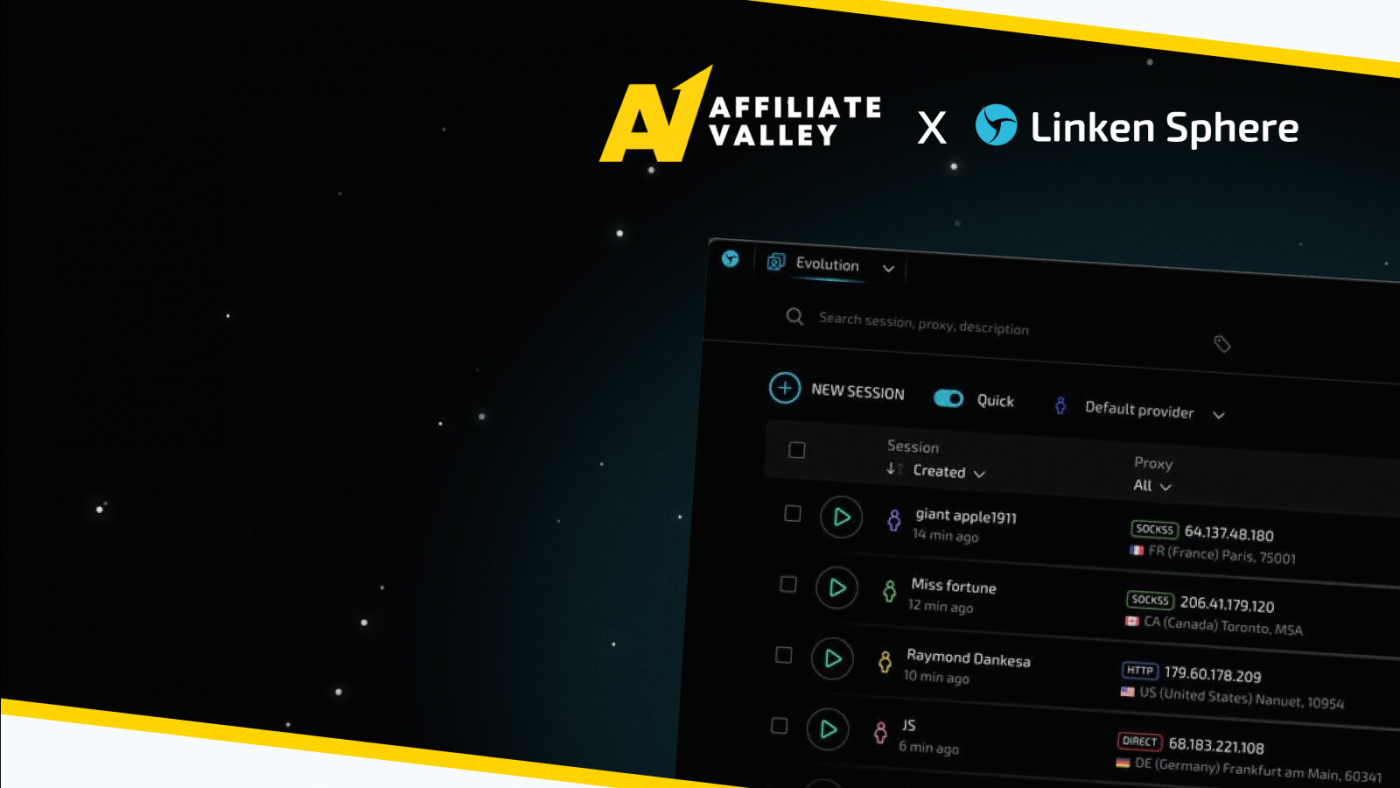In performance marketing, data privacy isn’t a buzz-word. It’s a must-have metric that directly affects your earnings. Whether you’re scaling CPA campaigns, juggling hundreds of ad accounts, or scraping competitive data, hiding your digital fingerprint is necessary for success.
Platforms such as Facebook, Google, Amazon and TikTok now fingerprint every session to track and limit users by session. Anti-detect browsers neutralize that problem by generating a fresh & spoofed identity for each profile and pairing it with isolated cookie jars.
When combined with a well-curated proxy stack, they become the gold standard for safe arbitrage, multi-account workflows and friction-free traffic management.
Let’s look at the best anti-detect browsers for affiliate marketing.
Key Takeaways
Browsers with anti-detection features are necessary for affiliate marketers, CPA specialists and digital marketing teams;
With their help you can securely work with multiple accounts by masking browser fingerprints;
Together with proxy servers they provide secure account management;
Perfect for anonymous search, online arbitrage, ad testing and research;
Top 5 anti-detection browsers of 2025: Multilogin, AdsPower, GoLogin, Dolphin, Kameleo.
What is an Anti-Detect Browser?
An anti-detection browser is a secure browser that hides or changes your digital footprint on the Internet by mimicking other users. It is used in affiliate marketing, anonymous browsing and multi-accounting to avoid detection by platforms. As a result, each session looks like a new unique user for the platforms online.
Features of an Anti-Detect Browser
Unlike standard browsers & VPN browsers with limited functionality, anti-detection browsers are designed to provide anonymity, scalability and accuracy.
This is the perfect solution for those working in affiliate marketing, media buying, CPA and digital research; in general, anyone who cares about staying undetected across multiple accounts.
Key features include:
Browser fingerprint spoofing. Hiding digital identity by changing Canvas, WebGL, fonts, time zone and more;
Integration with proxy servers. Support for SOCKS5, HTTP(S) and residential proxies to assign each profile a unique IP;
Multiple profile management. Allows you to create multiple isolated browser profiles without having to reverse this fact;
Compatible with automation systems. Easily combines with tools such as Puppeteer and Selenium to automate campaigns;
Cloud synchronization and collaboration. Secure sharing of profiles and sessions between distributed teams is available with these browsers;
Session saving. Allows to save and reload cookies and sessions to maintain accounts as real user profiles.
These tools are a must for any affiliate marketer, webmaster and traffic analyst who wants to operate multiple accounts securely.
Top 10 Anti-Detect Browsers in 2025
We have prepared a list of the top 10 best anti-detection browsers with powerful features and reliability for 2025.
1. Multilogin
Multilogin remains one of the most powerful and respected anti-detect browsers on the market in 2025.
The main part of Multilogin’s technology is the ability to completely isolate browser fingerprints. Each browser profile functions as a separate virtual machine with its own digital identity — including a unique user agent, WebGL data, Canvas hash, geolocation, fonts, languages, time zone and more.
This allows you to open a lot of profiles, when each of them looks like a separate real user operating from different devices and in different geographic regions.
This level of realism in profiles is very important for affiliate marketers. Popular advertising platforms have high-level fraud protection systems that detect and block suspicious behavior. Multilogin helps users bypass these checks by ensuring that each account looks like it's run by a unique person.
Key features:
Advanced fingerprint masking. This is Multilogin’s flagship feature, allowing users to simulate natural browser environments. Every detectable parameter can be manipulated (device specifications, operating system type, hardware attributes, and browser-specific data) to create highly realistic and undetectable profiles;
Cloud-based profile storage. All browser profiles are securely stored in the cloud and can be accessed from any location. This makes it easy to synchronize your work across multiple devices or with team members while maintaining complete data isolation and integrity;
Built-in proxy support enables you to switch IPs and geolocations with ease. Each browser profile can be paired with a unique proxy (HTTP, HTTPS, SOCKS5, mobile or residential. Multilogin ensures that proxies and fingerprints don’t conflict, minimizing the risk of bans;
Team collaboration tools. Multilogin offers powerful sharing and permissions controls for agencies and distributed teams. You can assign roles, control access to specific profiles and track user activity to ensure accountability across campaigns;
Automation integration. Multilogin supports integration with automation frameworks such as Puppeteer, Selenium and Playwright. This is ideal for developers and marketing teams looking to scale operations, scrape data or automate repetitive tasks, all while maintaining a low detection footprint;
Enterprise-level security. Multilogin is built with privacy and security at its core. No sensitive data is stored locally, and all communication is encrypted. The platform also supports two-factor authentication, action logging, and granular access control.
Multilogin offers three main pricing tiers:
Solo (€159/month): includes 100 browser profiles and 5 GB of proxy traffic;
Team (€399/month): 300 profiles, team collaboration features;
Scale (€999/month): 1000+ profiles, premium support, full API access.
2. GoLogin
GoLogin is one of the most affordable and flexible anti-detection browsers on the market in 2025. Its user-friendly interface makes it easy to manage fingerprints, making it a great choice for both novice users and experienced marketers managing systems with multiple accounts.
The browser supports automation, easy profile management and integrated proxy handling. GoLogin is a popular choice among affiliate marketers and webmasters worldwide.
Key features:
Custom fingerprint generator. GoLogin automatically generates unique browser fingerprints for each profile, including randomised Canvas, WebRTC, WebGL, fonts, geolocation and more;
Cloud profile storage and synchronization. All profiles are stored in encrypted cloud storage and can be accessed from any device or location. This makes it easy for teams or remote users to collaborate and access shared environments;
Built-in proxy integration. GoLogin is compatible with all major proxy types, including HTTP, SOCKS5, mobile and residential. Proxies can be configured per profile or applied in bulk, and the platform checks compatibility to minimize mismatches and bans;
Cross-platform support is also available. GoLogin is available on Windows, macOS, Linux and Android, enabling users to manage their operations from virtually any device, including tablets and mobile phones;
Automation ready. Developers can automate GoLogin via the GoLogin API using Puppeteer, Playwright, and Selenium integrations. This makes it ideal for scraping, testing, or automating repetitive marketing tasks;
Easy team collaboration. GoLogin supports team features such as shared profile access, team member management and permission settings, making it suitable for agencies managing multiple clients or verticals;
Browser isolation. Each profile runs in an isolated Chromium-based browser to ensure that no data leaks or cross-tracking occurs between sessions.
GoLogin is one of the most competitively priced anti-discovery browsers available:
Free Plan: 3 browser profiles, limited features
Professional ($24/month): 100 browser profiles, 2 GB of traffic
Business ($49/month): 300 profiles, 10 team members
Enterprise ($99/month): 1000+ profiles, priority support, extended automation API access
A 7-day free trial is available for all premium plans, allowing you to test the platform before making a decision.
3. Kameleo
Kameleo is a powerful and versatile anti-discovery browser with advanced fingerprint customization and mobile profile emulation capabilities. Unlike many competitors that focus solely on the desktop browser, Kameleo allows users to mimic Android and iOS environments, making it one of the most important tools for marketers working with mobile platforms or apps.
The offline profile system also provides complete privacy compared to some cloud-based solutions. Kameleo stores browser profiles locally, giving users direct control over their environment.
Key features:
Mobile and desktop profile emulation. Kameleo supports desktop and mobile browser profiles. You can create sessions that emulate Chrome, Firefox, Safari or Edge with mobile device fingerprints, including screen size, device memory and touch capabilities;
Advanced fingerprint customization. The platform provides granular control over browser fingerprint attributes, including Canvas, WebGL, AudioContext, fonts, media devices, time zone, geolocation and language;
Profile management. Each browser profile is isolated with its own cookies, local storage and cache. Users can easily export, import, and duplicate profiles to scale campaigns or experiments;
Proxy support. Kameleo allows proxy integration for each individual profile. Supported proxies include HTTP(S), SOCKS5, and SSH. IP rotation and proxy testing tools are also included.
Automation API. The Kameleo Local API enables complete automation using Puppeteer and Selenium. Users can create, modify, launch and control browser profiles via scripts, which is ideal for scraping, testing and botting;
Kameleo also offers local storage of profiles for users who prefer not to rely on the cloud. All browser profiles are stored locally, encrypted and secure. This feature is particularly appealing to privacy-conscious users and teams operating in regulated environments;
Stealth browsing engine. Kameleo uses customized versions of Chromium and Firefox with built-in stealth capabilities to avoid detection by anti-bot systems and fingerprinting scripts.
Kameleo offers four plans:
Basic (€59/month) – Desktop profiles only, essential features;
Advanced (€89/month) – Includes mobile profiles and more automation options;
Professional (€199/month) – Designed for teams and automation-heavy workflows;
Enterprise (custom pricing) – Tailored for large operations needing volume licensing and dedicated support.
A free trial is available. All plans come with API access and fingerprint generation tools.
4. Dolphin Anty
Dolphin Anty has quickly become a favorite among affiliate marketers and media buyers, particularly those running powerful ad campaigns on Facebook, TikTok, Google and other platforms with strict rules. Dolphin was developed by a team of experienced ad arbitrage specialists. It offers deep-level fingerprint spoofing, mass profile management, and seamless teamwork features.
Key Features:
Deep fingerprint control. Dolphin generates realistic browser fingerprints, covering Canvas, Audio, WebGL, the user agent, time zone, geolocation, hardware and more. You can randomise or customise each setting per profile;
Bulk account and profile management. Create, duplicate, group and run multiple profiles simultaneously. Dolphin is designed for scalability, with intuitive filtering, tagging and mass control features that are ideal for ad buyers who handle dozens or hundreds of accounts;
Team collaboration system. Manage teams with granular access levels, assign profiles to specific users and monitor activity logs. This is perfect for agencies running campaigns across multiple verticals or regions;
Cookie and pixel tools. Dolphin makes it easy to import and export cookies, and to load pre-warmed Facebook pixels into each browser session. This can reduce ad account bans and improve ad delivery consistency;
Proxy integration and testing. Easily assign HTTP, HTTPS, SOCKS5 and mobile proxies to each profile. The platform verifies proxy health and compatibility to prevent mismatches and detection;
Profiles launch quickly, often in under 10 seconds, even in bulk, making the platform ideal for time-sensitive campaigns or rotation strategies;
Built-in anti-detection engine. The browser is based on a hardened Chromium fork with stealth enhancements, making each session appear as a clean, natural user environment;
Automation support (API + extensions). Dolphin supports API access and browser automation extensions, enabling integration with bots, CRM tools and campaign management systems.
Dolphin Anty offers the following plans:
Start ($89/month) – 100 browser profiles, 1 user;
Team ($159/month) – 300 profiles, 5 users;
Business ($299/month) – 1000 profiles, 15 users;
Enterprise (Custom) – 5000+ profiles, dedicated support, white-label options.
A free trial is available upon request.
5. AdsPower
In 2025, AdsPower has become one of the most feature-rich and automation-friendly anti-discovery browsers. It was originally designed for Chinese e-commerce users who needed to manage multiple store accounts. It later evolved into a full-fledged browser for affiliate marketers and media buyers. It has everything from multi-account fingerprint isolation to RPA-based automation. The interface, meanwhile, is logical and easy to understand.
Key features:
Smart fingerprint management. AdsPower automatically generates unique browser fingerprints for each profile. You can customise and manage user-agent strings, Canvas data, WebGL, WebRTC, language, resolution and more, ensuring that no two profiles are the same;
Multi-engine support. Users can choose between Chromium- or Firefox-based browser cores depending on their platform needs, providing greater flexibility when navigating ad platforms or marketplaces with different detection methods;
Built-in RPA automation centre. AdsPower’s visual automation tool enables users to record actions such as clicks, form filling and navigation, and convert them into repeatable workflows. This is ideal for bulk account registration, login routines and publishing posts – all without writing code.
Cloud profile sync. Profiles are stored securely in the cloud and can be accessed from any device. Teams can collaborate from different locations without risking data loss or sync issues;
Proxy management. AdsPower supports HTTP(S), SOCKS5 and SSH proxies. Proxies can be assigned to each profile and the system includes IP checker tools to test connections before launch;
Team and permission system. Users can create multi-level team structures, assign access rights and track user activity through built-in logs – all of which are essential for securely managing large campaigns;
Cookie and local storage importing. Import third-party cookies or session data into any browser profile to avoid triggering platform verifications or to warm up new accounts more quickly;
API access and developer tools. Tech-savvy users can automate tasks, create profiles, launch sessions and integrate with external tools such as CRMs or bots using AdsPower’s REST API.
AdsPower offers some of the most flexible plans on the market:
Free Plan – 2 browser profiles;
Basic ($9/month) – 10 profiles;
Professional ($29/month) – 100 profiles, automation tools;
Team ($89/month) – 300+ profiles, team features, API access;
Enterprise (custom) – Thousands of profiles, white-labeling, dedicated support.
Each paid plan comes with a 3-day free trial. For affiliate marketers on a budget or agencies managing remote teams, AdsPower offers serious value with room to scale.
6. Incogniton
Incogniton is a modern anti-detection browser with a clear interface, high speed and efficient performance. This has made it a pretty popular option among solo marketers and virtual assistants. In 2025, Incogniton is expanding its functionality by adding robust fingerprint protection, cloud synchronization features, and support for multi-disciplinary automation.
Key features:
Anti-fingerprint technology. Incogniton masks all key browser fingerprinting vectors, including Canvas, WebGL, AudioContext, screen resolution, time zone, geolocation and system fonts, to prevent detection by ad platforms and fraud prevention systems;
Easy profile creation and management. Users can create an unlimited number of browser profiles depending on the plan, assign tags and groups for easier sorting and duplicate successful setups to save time;
Secure cloud sync. Browser profiles can be stored securely in the cloud and accessed from multiple devices. This ensures data continuity and security for teams and remote workers.
Multi-user collaboration. Incogniton supports role-based access, enabling you to assign profiles to team members and track usage via built-in logs;
The browser supports all major proxy types (HTTP, SOCKS5 and SSH) and has an intuitive dashboard for testing and assigning proxies to profiles;
Automation support. Developers can integrate Incogniton with Selenium or Puppeteer to automate tasks such as account creation, login routines and data scraping;
Data import and export. Import cookies, user agents and profile settings from other tools, or export your own setups for sharing and backup;
Cross-platform compatibility. Incogniton is currently available on Windows and macOS, with plans to support Linux in the future.
Incogniton offers flexible pricing tailored to different needs:
Free Plan – 10 browser profiles, limited features;
Starter ($29.99/month) – 50 profiles, automation tools, 1 user;
Professional ($79.99/month) – 150 profiles, team collaboration, advanced automation;
Multi-User ($149.99/month) – 500 profiles, 10 users, API access;
Enterprise (custom) – Unlimited profiles, white-label options, dedicated support.
Each plan comes with a 7-day free trial.
7. VMLogin
VMLogin is a powerful anti-detection browser built to thoroughly handle multiple accounts. It is known among affiliate marketers and agencies for its advanced fingerprint spoofing technology, deep automation capabilities and scalable infrastructure. The browser is popular among those who run high-budget advertising campaigns, product testing, and data collection tasks at scale.
Key features:
Advanced anti-detection technology. VMLogin uses its own technology to spoof almost all trackable fingerprint elements, including Canvas, WebGL, audio, fonts, time zone, geolocation, media devices and more;
Virtual browser containers. Each browser profile runs in its own fully isolated container to prevent cross-contamination and reduce the risk of detection from shared cookies, cache or IP leaks;
Bulk profile management. VMLogin allows the mass creation, duplication, grouping and launching of profiles, making it ideal for ad agencies and teams running large-scale testing or ad arbitrage operations;
Comprehensive proxy support. HTTP(S), SOCKS5 and SSH proxies are supported. Users can assign different proxies to each profile and test IPs before launching sessions;
Multi-user collaboration tools. Built-in permission management enables team leaders to assign roles, monitor usage and set restrictions for each team member, which is essential for secure collaborative workflows;
Profile storage is encrypted and browser profiles can be stored locally or synced across a private server for enhanced team collaboration;
Users can schedule tasks and automate repeatable actions such as logins, content publishing or traffic generation with third-party bot integrations.
VMLogin is positioned as a premium solution for professional use. Its plans include:
Starter ($99/month) – 100 profiles, 2 users, essential features;
Team ($199/month) – 300 profiles, 5 users, API access;
Business ($299/month) – 1000+ profiles, 10 users, advanced automation;
Enterprise (custom) – Unlimited profiles, custom server sync, priority support, white-label options.
A free 3-day trial is available for new users to test its capabilities.
8. SessionBox
SessionBox is an anti-discovery browser extension. It is suitable for those users who need to manage multiple sessions within one browser interface.
SessionBox does not have fingerprint spoofing features like powerful browsers like Multilogin or VMLogin. However, it does allow quick, easy, and convenient management of multiple accounts for those who don't need complete anonymity.
Key features:
Create multiple concurrent sessions from within your existing browser (Chrome, Edge or Opera) with isolated session management. Each tab has its own cookie store and cache, so there is no cross-login contamination;
Cloud sync and portability. Save sessions to the cloud and access them on multiple devices. This is particularly useful for digital nomads and marketers who work across several machines or environments;
Proxy per session. Assign different proxies to each session tab. This enables you to maintain separate IP addresses for each account, thereby reducing the risk of bans or blocks from social and ad platforms;
Session sharing allows you to share session links with your team, virtual assistants or clients without handing over passwords. The recipient can open the same session with the same login state;
Lightweight and fast. Unlike full anti-detection browsers, SessionBox works directly inside your default browser and requires no extra software or complex setup. It is ideal for users who value speed and simplicity;
Security and encryption. All session data is encrypted both locally and in the cloud. You can choose whether to store sessions locally or in your SessionBox account;
Premium version features. The pro version allows for automation through session scripting, which is useful for repeating login flows or testing user behaviour scenarios;
Cross-browser compatibility. SessionBox is available as an extension for Chrome, Firefox, Edge and Opera, giving users flexibility in their browser choice.
SessionBox offers one of the most budget-friendly pricing:
Free Plan – up to 5 local sessions;
Premium ($7/month) – cloud sessions, proxy support, sync across devices;
Team ($59/month) – team sharing, advanced session controls;
Enterprise (custom) – large team support, volume licenses, priority updates.
If you're new to arbitrage and need quick access to multiple accounts without fingerprint manipulation, SessionBox is a great lightweight option with a low price tag.
9. GoLogin
GoLogin has become a popular browser-based anti-detection tool pretty quickly due to its easy-to-understand interface, affordable price, and extensive customization options. It is designed for marketers and entrepreneurs who need to use multiple online identities without the risk of detection.
Realistic fingerprint spoofing. GoLogin simulates a real browser environment by spoofing the following: Canvas, WebGL, Audio, WebRTC, time zone, geolocation, CPU, memory, screen size and fonts. Each profile appears as a unique device to detection systems;
The Orbita browser engine is built on Chromium and includes hardened stealth capabilities that are optimised to resist the fingerprinting techniques used by major ad platforms and e-commerce websites;
Cross-platform and web access. Use GoLogin from any device, including Windows, macOS and Linux, or directly from a browser via the cloud-based WebApp. This is great for remote teams and mobile affiliates;
Encrypted profile storage. Securely store your browser profiles in the cloud. Each session is encrypted to protect sensitive account data and ensure privacy;
Multi-user collaboration. Share profiles with your team using role-based access permissions. View logs to monitor account actions and prevent overlap or mistakes;
Proxy management supports SOCKS5, HTTP(S) and SSH proxies. Each profile can be bound to a unique proxy for geo-targeting or identity masking;
Easily warm up new accounts by importing cookies or session data with cookie import/export & session sync. You can also export working sessions to share or reuse;
Automation support. compatible with Puppeteer and Selenium, enabling developers to automate tasks fully – from login flows to bulk ad uploading.
GoLogin is one of the more budget-friendly full-stack options:
Solo ($24/month) – 100 profiles, 1 user;
Start ($49/month) – 300 profiles, 3 users;
Team ($99/month) – 1000 profiles, 5 users;
Business (Custom) – unlimited profiles, unlimited users, premium support.
Every plan includes a free 7-day trial.
10. Ghost Browser
Ghost Browser can't be called a classic anti-detection browser in the matter of full fingerprint spoofing like Multilogin or GoLogin. It is based on Chromium, and therefore works like Chrome - but with additional features.
Users can log into multiple accounts on the same site at the same time, create color-coded sessions for organization, and set proxies for each tab. For affiliate marketers managing multiple client accounts this extension will be a practical and low-maintenance solution.
Key features:
Multi-session tabs. Each tab acts as a separate browser session. You can log into different accounts on the same website in the same window without any conflicts arising;
Colour-coded session isolation. Tabs are grouped and colour-coded to distinguish between sessions. This helps you to manage multiple workflows simultaneously;
Built-in proxy support allows you to assign different proxies to individual tabs or sessions. Supports SOCKS5 and HTTP(S) proxies, which is useful for geolocation testing or avoiding IP-based restrictions;
Session persistence allows you to save and restore tab groups with all session data (cookies and login states) intact. This is ideal for picking up where you left off, even across reboots;
Since it’s built on Chromium, Ghost Browser supports most Chrome extensions, including password managers, SEO tools, social automation plugins and developer tools;
Workspace management. Save workspaces containing sets of tabs and sessions. This is useful for managing multiple clients or projects;
You can drag and drop tabs between sessions to move them easily between different identity groups or workspaces without breaking the session;
Ghost Browser focuses on user experience, with less emphasis on fingerprint masking. This makes it faster and more efficient than full virtual container browsers.
Ghost Browser offers flexible pricing:
Basic ($21/month) – 3 identities, 1 workspace;
Pro ($39/month) – Unlimited identities, unlimited workspaces;
Team ($59+/month per user) – Centralized license management, role-based access, priority support;
Enterprise (custom) – Bulk licensing, white-label options, integration support.
They also offer a 7-day free trial so you can test features before committing.
Comparison of the best anti-detect browsers
There are many anti-discovery browsers on the market right now. Choosing the right one depends on your specific needs - whether you're an affiliate marketer, media buyer, e-commerce seller, or part of a large agency team. Some browsers are primarily focused on fingerprint spoofing and automation, while others focus on easy multi-session browsing. We've made a comparison table of browsers with their key features and prices so you can find the right one for you.
Best Tools for Testing Anti-Detect Browsers
Even the best anti-detection browser is only as effective as its ability to bypass real detection systems. It is important to test your browser settings so that fake fingerprints, proxies, and session behavior look natural and are not detected by websites and platforms.
Without such testing, there is an increased risk of you being detected, which can lead to sanctions and account blocking. You can test your anti-detect browser functions using the following services.
1. CreepJS
CreepJS is one of the most advanced browser testing tools available. It analyzes over 40 footprint components, including Canvas, AudioContext, WebGL, device memory and plugin data, and then gives you a score for uniqueness and traceability. Great for checking how well your anti-detector browser mimics a real user and if it's leaking any data.
2. Pixelscan.net
Pixelscan is a quick and easy way to check if your browser is running common fingerprint detection scripts. It checks for signs such as WebRTC leaks, proxy mismatches and Canvas fingerprint errors. Great for quick diagnostics before launching campaigns, especially for detecting proxy vulnerabilities or fingerprint mismatches.
3. BrowserLeaks
BrowserLeaks provides detailed information about all the data your browser transmits to websites. with it you can check headers, WebRTC, JavaScript, geolocation, plugins, fonts and much more. Ideal for those who want to get complete information about every browser parameter and its behavior under test conditions.
Why Combine Anti-Detect Browsers with Proxies
Anti-detection browsers that mask browser fingerprints are important to combine with home or mobile proxy servers to change IP addresses and geolocation. This combination will enhance anonymity, especially for platforms with strict rules. For affiliate marketing, media buying or CPA traffic, this is crucial.
Using a proxy browser ensures that each virtual profile is uniquely identified, including a new IP address and device fingerprint, This makes multi-accounting secure and scalable.
Top proxy services to use with anti-detect browsers:
Bright Data. Premium residential & mobile proxies for geo-targeting and testing;
SOAX. Reliable, rotating IPs ideal for webmasters, researchers, and marketers;
Smartproxy. Affordable and easy-to-integrate solution for affiliate campaigns and automation.
Summary
Anti-detect browsers like Multilogin, GoLogin, Kameleo, Dolphin Anty, and others are great to protect online operations by cloaking unique fingerprints, isolating sessions and pairing seamlessly with proxies. Their protection enables affiliate marketers, media buyers and multi-account teams to scale campaigns, bypass platform filters and prevent account bans.
FAQ
What does an anti-detect browser do?
An anti-detection browser hides or alters the browser fingerprint to appear as a unique user on the network. This helps avoid detection, bans, and tracking, which is important for affiliate marketers, multi-accounting, and traffic research.
What is the best anti-detect browser?
Choosing the best browser for anti-discovery protection depends on the type of activity you are doing. For deep stealth, Multilogin or AdsPower are best. For budget users, GoLogin and Dolphin top the list of the best anti-detection browsers of 2025.
What is the best browser for anti-fingerprinting?
Kameleo provides the highest level of fingerprint spoofing, even when simulating mobile use. They are ideal for anonymous browsing, incognito searches and tracking prevention in digital marketing tasks.
Who needs anti-detect browsers?
Anyone managing multiple online accounts: affiliate marketers, CPA specialists, media buyers, webmasters and traffic researchers. These tools are also used for incognito testing, secure automation, and secure multi-account management.






No comments yet. Be the first!